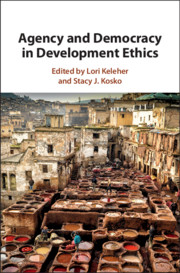Book contents
- Agency and Democracy in Development Ethics
- Agency and Democracy in Development Ethics
- Copyright page
- Dedication
- Contents
- Figures
- Tables
- Contributors
- Acknowledgments
- Introduction
- A Note from David A. Crocker
- Part I Development Ethics
- Part II Agency
- Part III Democracy
- 11 On Some Limits and Conflicts in Deliberative and Participatory Democracy
- 12 An Agency-Focused Version of Capability Ethics and the Ethics of Cordial Reason
- 13 The Double Democratic Deficit
- 14 Deliberative Democracy and Agency
- 15 Consensus-Building and Its Impact on Policy
- Part IV Development Ethics, Agency, and Democracy
- Index
- References
12 - An Agency-Focused Version of Capability Ethics and the Ethics of Cordial Reason
The Search for a Philosophical Foundation for Deliberative Democracy
from Part III - Democracy
Published online by Cambridge University Press: 26 February 2019
- Agency and Democracy in Development Ethics
- Agency and Democracy in Development Ethics
- Copyright page
- Dedication
- Contents
- Figures
- Tables
- Contributors
- Acknowledgments
- Introduction
- A Note from David A. Crocker
- Part I Development Ethics
- Part II Agency
- Part III Democracy
- 11 On Some Limits and Conflicts in Deliberative and Participatory Democracy
- 12 An Agency-Focused Version of Capability Ethics and the Ethics of Cordial Reason
- 13 The Double Democratic Deficit
- 14 Deliberative Democracy and Agency
- 15 Consensus-Building and Its Impact on Policy
- Part IV Development Ethics, Agency, and Democracy
- Index
- References
- Type
- Chapter
- Information
- Agency and Democracy in Development Ethics , pp. 306 - 324Publisher: Cambridge University PressPrint publication year: 2019



